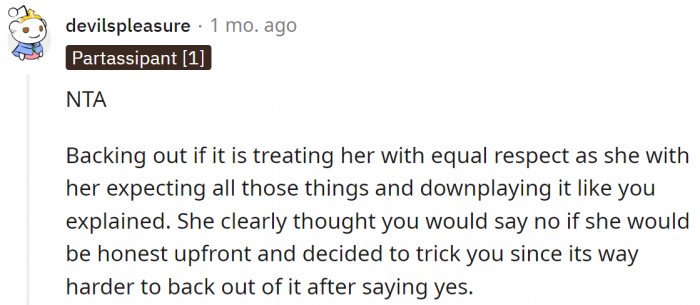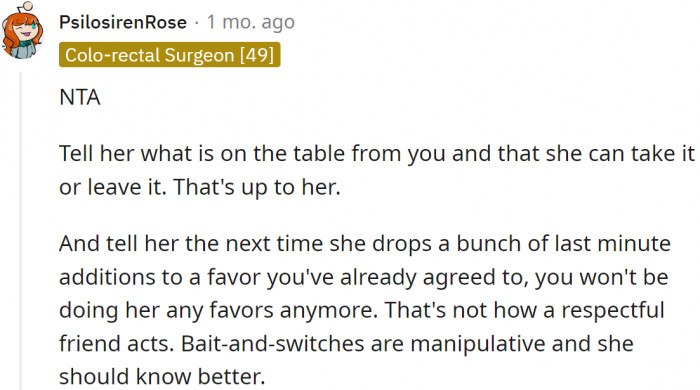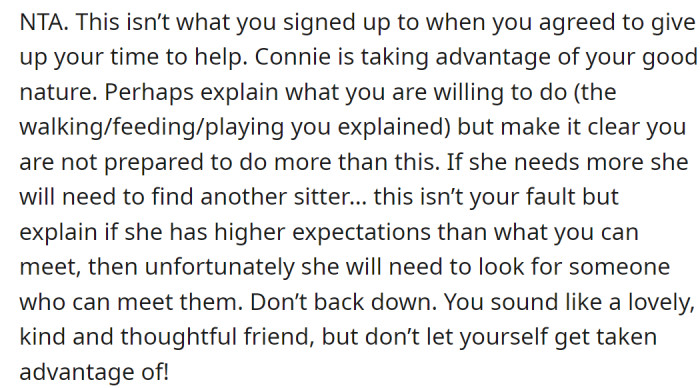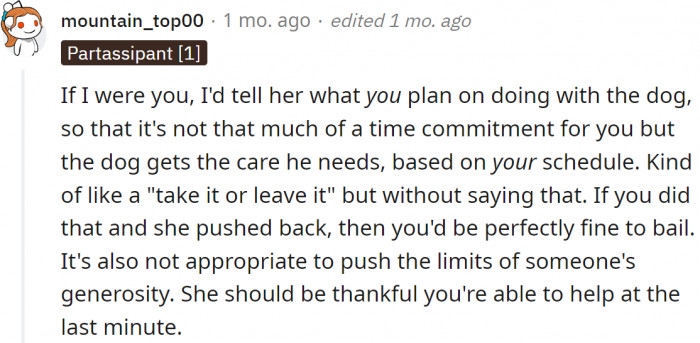Woman Has Second Thoughts About Accepting to Sit Her Friend's Dog Because She Is Trying to Manipulate Her With an Extended To-Do List
Going on a trip sometimes requires a lot more than just packing a suitcase. For example, if you have plants, you'll need to find someone to water and maintain them while you're away.
Or, if you have a pet, you'll look for a person or a boarding kennel to take care of your pet while you enjoy your vacation. Everything has to be arranged before the trip, with specific details about what you expect them to do so that both sides can avoid any unpleasant misunderstandings.
However, there are times when you just can't find professionals for that job, so naturally, a close friend is the best option in that case. Friends will do their best to help each other, and they are often delighted to assist.
In this particular story, a friend was asked to sit for another friend's dog and house while she would be on vacation with her boyfriend. It included regular tasks like walking, playing, and feeding the dog, so she immediately agreed to help.
But a couple of days before the trip, her friend sent her a list of new, unmentioned duties she would have to perform with the dog. The friend was shocked to see how many responsibilities she would have, so she told her that the list would take a lot more time than expected and asked her to shorten it.
However, her friend refused, explaining that she didn't want to disrupt her dog's usual routine. Now, the friend is in a dilemma and is considering backing out of dog-sitting because it will take her entire days for a whole week if she accepts.
Here's the entire story and the friend's concern:

She likes helping her friends when they need it:

Her friend will need someone to look after her dog while she is on vacation, so she agreed to help.

Understanding Manipulation in Relationships
The issue of feeling manipulated into caring for a pet reflects broader themes of personal boundaries and relational dynamics. Psychologists note that manipulation often stems from a lack of clear communication and respect for each other's time and energy.
Research from the American Psychological Association emphasizes the importance of establishing boundaries in relationships to prevent feelings of resentment and exploitation.
Exploring Feelings of Manipulation
A clinical psychologist explains that feelings of being manipulated can trigger strong emotional reactions, often stemming from a desire for autonomy and independence. When one person feels their time or commitments are being controlled by another, it can lead to resistance and resentment. This reaction is a natural defense mechanism that protects personal boundaries.
Research in social psychology suggests that perceived manipulation can disrupt trust and communication. When individuals feel pressured to conform to someone else's agenda, it can lead to a breakdown in relational dynamics, fostering conflict rather than cooperation.
But the problem arose when she sent her a to-do list.

It was full of all new expectations:

So she had to react and tell her friend it was a lot more than she originally planned.

Additionally, the emotional labor involved in caring for pets can create stress when not mutually agreed upon. A study conducted by the University of Virginia found that individuals often experience burnout when they feel obligated to fulfill roles without proper acknowledgment or support. This situation serves as a reminder to openly discuss expectations around caregiving roles and responsibilities.
Recognizing these dynamics can help both parties engage in healthier negotiations.
Understanding the motivations behind such behaviors can help individuals respond more constructively. A study published in the Journal of Conflict Resolution indicates that when people feel their autonomy is threatened, they are more likely to react defensively. This means that recognizing these triggers can enable individuals to engage more thoughtfully in discussions about shared responsibilities.
By exploring the underlying motivations for asking favors, individuals can better assess whether these requests stem from genuine need or a desire to control. This awareness can help mitigate feelings of manipulation and foster a more collaborative environment.
So she tried to reach a compromise with her friend, but unfortunately, it didn't go as she thought it would:

And, here's her question:

Seems like her friend tried to manipulate her

Setting Healthy Boundaries
Establishing boundaries is crucial to avoid feelings of manipulation. Experts suggest that partners should engage in honest discussions about what each person is willing to contribute, especially regarding caregiving for pets. For example, setting clear limits on time commitments can help both individuals feel respected and valued.
This can lead to a more balanced approach to shared responsibilities, fostering mutual understanding.
Setting Healthy Boundaries
Establishing clear boundaries is crucial in preventing feelings of manipulation from arising. Experts recommend having direct conversations about personal limits and expectations, especially when it comes to responsibilities involving others. Setting boundaries allows individuals to communicate their needs effectively, reducing the likelihood of misunderstandings.
Additionally, using assertiveness training techniques can empower individuals to express their needs without feeling guilty. This approach can help maintain healthy relationships while ensuring that personal autonomy is respected.
She should be honest with her friend and tell her without any hesitation that her additions are a lot

"It seems to me that she purposefully left out these things when she initially asked"

Connie is definitely taking advantage of her

In addition to boundary-setting, learning to say no is an essential skill in maintaining healthy relationships. Research from the Journal of Applied Psychology suggests that individuals who practice assertive communication are more likely to feel empowered and less likely to succumb to feelings of guilt or obligation. Building assertiveness can help individuals protect their time and energy.
This approach encourages healthy interactions and can prevent the development of resentment.
Moreover, practicing self-reflection can help individuals identify their feelings about the requests made by friends. A clinical psychologist suggests that journaling about these interactions can clarify one's thoughts and emotions, allowing for a more measured response. Engaging in self-reflection can enhance emotional intelligence, enabling individuals to navigate their relationships more effectively.
By understanding one’s feelings and articulating them clearly, individuals can foster healthier interactions and reduce conflict.
She should explain to her what she's willing to do, kind of "take it or leave it".

It could be a good plan

"If she won’t budge, she’ll be missing her trip, and that’s on her."

The Importance of Self-Care
Self-care is another vital aspect of managing the emotional burden associated with caregiving. Clinical psychologists emphasize that prioritizing one's own needs can prevent burnout and enhance overall well-being. Engaging in self-care practices, such as mindfulness or leisure activities, can help individuals recharge and reflect on their boundaries.
This can ultimately lead to healthier relationships where both individuals feel supported.
Cultivating Mutual Respect
Ultimately, fostering mutual respect and understanding is key to navigating these challenging dynamics. A relationship expert suggests that individuals approach discussions about favors with curiosity rather than defensiveness. This means asking open-ended questions to better understand the other person's perspective and motivations.
By creating a dialogue that encourages sharing, individuals can explore potential compromises and find solutions that address both parties' needs. This collaborative approach can lead to a more supportive and respectful friendship.
Connie should agree to the basics if she wants her to sit for the dog so badly.

Hopefully, this advice helped her resolve the unpleasant situation she found herself in. She seems like a kind person, but that doesn't mean she should neglect her life to help a friend who clearly doesn't respect her own commitments.
Even though we adore dogs, when someone needs a dog sitter, they should pay a fair amount to ensure everything that is needed or settle for the minimum when asking family or friends at the last minute to step in and help.
This situation illustrates the necessity of balancing personal autonomy with the needs of others. By prioritizing clear communication and mutual respect, individuals can navigate relationships more effectively and reduce feelings of manipulation.
Psychological Analysis
This scenario highlights the complexities of interpersonal requests and the feelings of manipulation they can evoke. It's essential for individuals to communicate their boundaries clearly and engage in open dialogue to foster understanding and respect in their relationships.
Analysis generated by AI
Analysis & Alternative Approaches
In relationships, understanding personal boundaries and motivations is essential for maintaining healthy dynamics. Dr. Ramani Durvasula, a clinical psychologist, emphasizes that "clear communication about needs and boundaries is vital for healthy relationships." By fostering open dialogue and mutual respect, individuals can significantly enhance their interpersonal connections. As noted on her professional website, Dr. Ramani Durvasula suggests that prioritizing these aspects can lead to more satisfying and supportive friendships.
Ultimately, recognizing the signs of manipulation and addressing them directly can lead to healthier relationship dynamics. Studies indicate that when partners communicate openly about their needs and boundaries, they are more likely to avoid feelings of resentment and frustration. By fostering an environment of mutual respect, partners can build a stronger foundation for their relationship.
Analysis & Alternative Approaches
In conclusion, navigating feelings of manipulation in relationships requires clear communication and boundary-setting. By prioritizing self-care and honesty, individuals can create healthier dynamics that honor both partners' needs and responsibilities. Understanding these emotional dynamics can lead to stronger, more supportive relationships.



